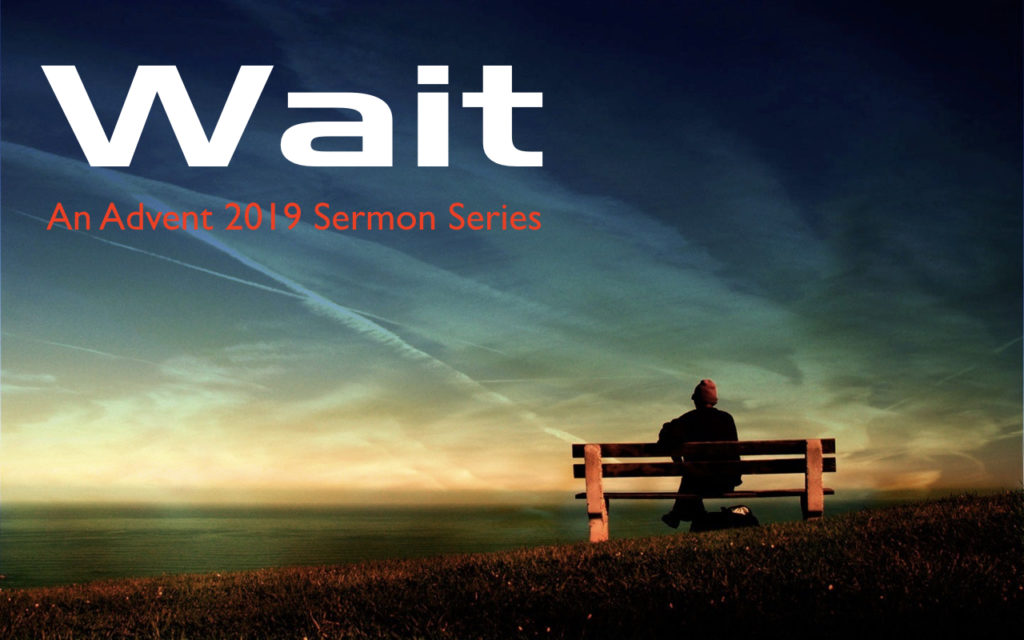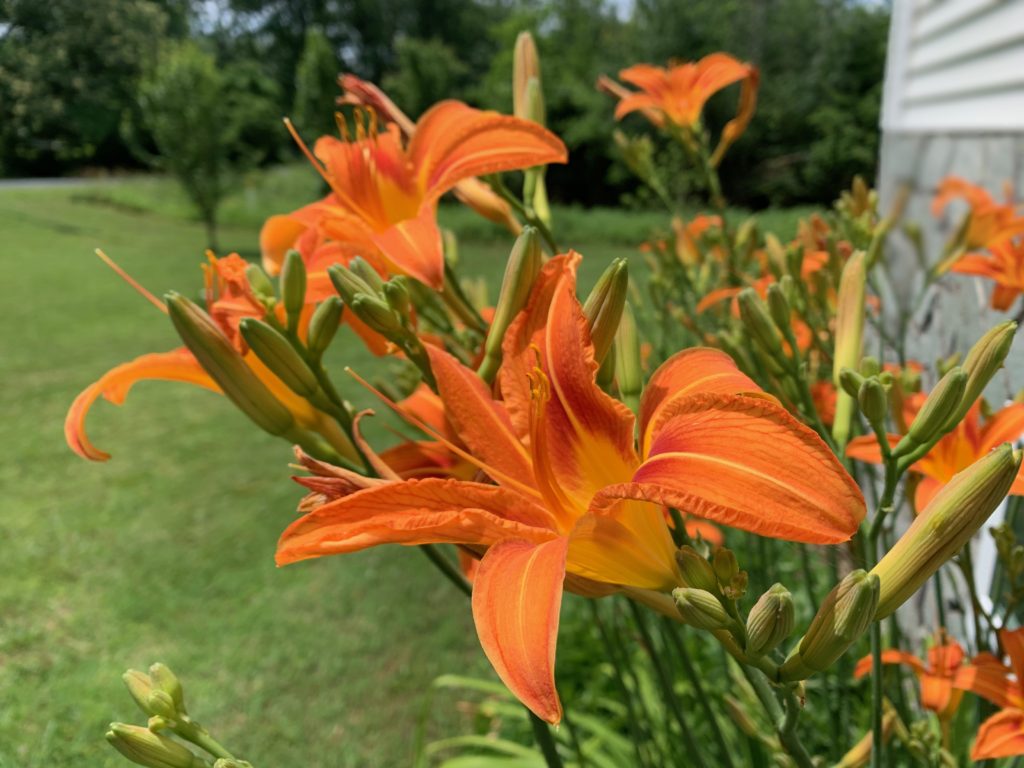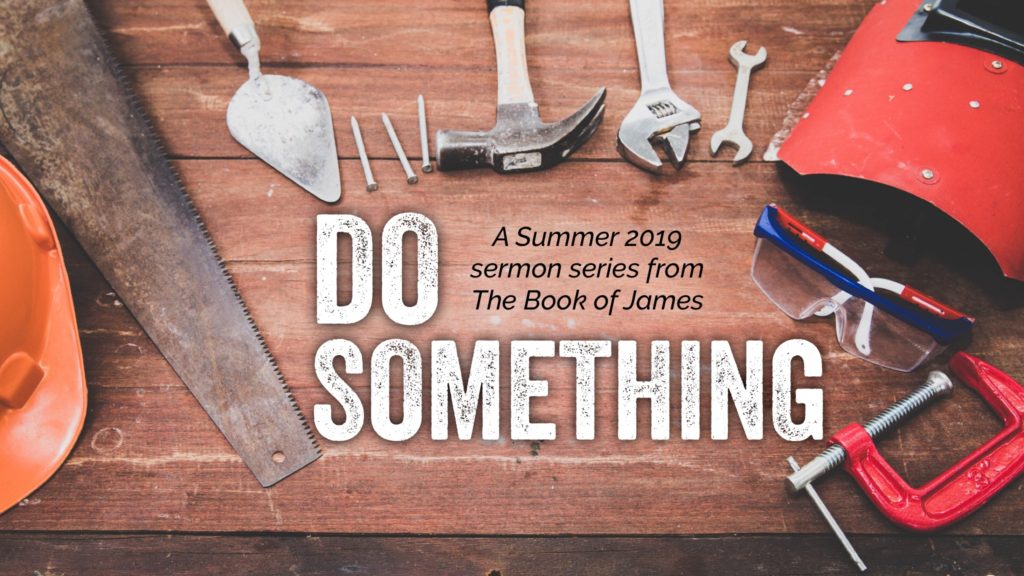
Posted on Jan 27, 2020 by David Garrison in Announcements, Devotions, HomePage, News, Reading the Bible, Spiritual Growth, Table Talk | 0

Have you ever felt overwhelmed with how long and diverse the Bible is? Do you struggle with seeing it as “one book” with a single message? Join us at Table Talk as we explore the unity of the Bible. We’ll be meeting at 5:45 p.m. on February 5, 12, and 19. This is a practical, hands-on series that will equip you to read through the Bible with greater understanding. You can expect to gain useful tools and resources that will make reading the Bible from cover to cover a more meaningful experience.
Join us Wednesdays, 5:45-6:45, beginning February 5.

Posted on Dec 30, 2019 by David Garrison in Announcements, Christian Living, Devotions, General, HomePage, News, Pastor's Corner, Reading the Bible, Sermons, Spiritual Growth | 0

Is Anyone Listening?
“What is the word that Jesus has for your church?” I looked at my spiritual director a little befuddled, mostly because I wasn’t expecting the question. “Do you believe that Jesus has a word for your church today?” Well, of course I do. “So are you listening for it?” That’s really the question isn’t it? Am I listening for Jesus’ word to Northminster? To me? Just how does Jesus speak to us today? I fully believe that Jesus can speak to us in any form he chooses — directly, through someone else, a nudge of the conscience, the gift of a beautiful sunset, so on and so forth. The primary way He speaks to us is through His Word, the Bible. When we read the Bible, we’re usually pretty aware that we are reading, in some respects, a conversation between God and other people. We easily forget that God’s Word is just as much a conversation between us and God as well. Is anyone listening?
Tuning In
Much like tuning our car radio (does anyone even do that anymore?) to get the best reception of our favorite radio station, we will hear that for which we’re listening. When we step outside on a spring or summer day, at first the world sounds quiet. As we listen, as we “tune in,” we begin to hear the birds chirping and the wind rustling the leaves. When we listen more attentively, we begin to pick out different kinds of birds singing to each other. Eventually we can even locate particular birds in the trees and to whom they’re singing. We might not think Jesus is speaking to us, but He is, and we need to make sure we’re tuning in. Are we listening?
I was in the Spirit on the Lord’s day, and I heard behind me a loud voice like a trumpet saying, “Write what you see in a book and send it to the seven churches, to Ephesus and to Smyrna and to Pergamum and to Thyatira and to Sardis and to Philadelphia and to Laodicea.” (Rev. 1:10–11)
During the season of Epiphany (all of January and February this year), we’re going to focus on “tuning in” to hear what Jesus is saying to us by listening in on what He said to the seven churches in Revelation. In the Bible, the number seven denotes fullness, totality and comprehensiveness. The letters to these seven historical churches represent the church universal. The Word that Jesus had for these seven churches is also the word He has for us individually, for Northminster, and the Church (capital “C” means the universal church, all churches in all times and all places) today. We will use these seven letters to help us tune in to what Jesus is saying to us right now. Once we get tuned in, we can start listening.
The Word That Speaks
Jesus isn’t just speaking to us through the seven letters of Revelation, though. We believe that every page of the Bible is the inspired Word of God, but most of us have never read through the entire Bible. How can we say we’re listening to Jesus if we don’t know what His Word says? Beginning on Ash Wednesday, we will embark on a journey to listen to the Word of God itself, the entire counsel of Scripture. In the 90 days from Ash Wednesday through Pentecost, we will read the entire Bible together. I know that sounds kind of daunting, but it works out to just 12 pages a day. Look at it like “binge reading” the entire Bible. Now that many shows and TV series are available to stream, you can watch an entire series in a weekend. “LOST” makes a lot more sense when you binge it (although it’s still really confusing). We’re going to do the same thing with the Bible. The sermons on Sundays will follow along with the weekly readings and we’ll provide tools and other things to help us all stay on track together. We’ll share more details about how this is going to work in next month’s newsletter.
The Session and I have been talking and praying about this for many months, and we’re really excited about what God will reveal to us — as individuals and as a church — when we tune in and start listening for His word to us. In 2020, let’s make sure we’re tuned in to Him and listening together.
For the word of God is living and active, sharper than any two-edged sword, piercing to the division of soul and of spirit, of joints and of marrow, and discerning the thoughts and intentions of the heart. (Heb. 4:12)
Blessings,
Rev. David Garrison

Posted on Dec 1, 2019 by David Garrison in Christian Living, Devotions, General, HomePage, Pastor's Corner, Spiritual Growth, Worship | 0

“Return, O LORD! How long? Have pity on your servants!” — Psalm 90:13
The Christian calendar begins, not with January 1st, but instead with the first Sunday in Advent. It’s an interesting decision that the early church fathers made in doing this. Interesting because the Christian year begins not with resolutions and activity, but with waiting. Advent is an intentional season of preparation and pause, a time to reflect and prepare for the celebration of the coming of the Lord’s Messiah, Jesus Christ. There is great wisdom in this decision, particularly for our current times. We live in a culture of hurry and rush and activity, the last thing we want or like to do is wait for anything.
By starting the year with a season of waiting, we are invited to settle into a different rhythm of life and living, a rhythm that is ultimately about trust. Trusting in the God who created Time, trusting in the One who has set His plans in motion and will see them through, trusting that there is One who knows and understands more than we do, trusting that He is good and that He is love.
So the Christian calendar begins with a reminder that there is a holiness and a righteousness in waiting. But there is a hard-ness and challenge in waiting as well. The Psalmists cry out, with great regularity, “How long, O Lord?” Even as they wait on the Lord, they express their frustration, their discontent. And in that we are shown that there is such a thing as a holy discontent.
But as much as we are waiting to celebrate the birth of our Savior, the season of Advent points to an even more significant event, an event most of us usually forget is yet to and actually is going to happen. The Hebrews waited over 500 years for the Messiah to come the first time. We’ve been waiting nearly 2,000 years for him to return. May our lives be lived with the faith that comes from knowing our Savior’s return is imminent, with the hope that comes from knowing that what is broken will soon be made right, and with the love for those who don’t yet know that their Messiah has already come once and will come again.
“He who testifies to these things says, “Surely I am coming soon.” Amen. Come, Lord Jesus!” — Revelation 22:20
Blessings,
Rev. David Garrison

Posted on Nov 1, 2019 by David Garrison in Christian Living, Devotions, General, HomePage, Ministry, Pastor's Corner, Spiritual Growth | 0

So then, just as you received Christ Jesus as Lord, continue to live in him, rooted and built up in him, strengthened in the faith as you were taught, and overflowing with thankfulness. (Col. 2:6–7)
“Continue to live in him, rooted and built up, strengthened in the faith as you were taught”
Each year, as part of my benefits package, I am given two weeks of study leave. This isn’t two extra weeks of vacation; it’s an intentional time for pastors to do exactly what Paul says in this verse, to be ‘rooted and built up [in Christ], strengthened in the faith.” Just as we need exercise to keep our bodies healthy, we also need to be intentional in strengthening our faith. That is what study leave is meant to provide. I spent the time reading several books about pastoring in our current cultural reality, meeting with a spiritual director for my own spiritual growth and well-being, and sketching out a sermon plan for next year. Thank you for letting me have the time away, and I look forward to sharing with you what God has been sharing with me!
“Overflowing with Thankfulness”
Thank you, also, for the wonderful cards and expressions of appreciation you all shared this past weekend. What an unexpected surprise to receive upon my return from study leave! One of my greatest joys is being able to tell others about what a blessing you all are to my family and me and how thankful we are to get to serve alongside you. So many pastors serve places that are hard and challenging, but serving Northminster is a joy and delight. We truly are “overflowing with thankfulness” for each one of you.
For what are you “overflowing with thankfulness”? In the midst of the craziness of the holiday season, it can be easy to forget to reflect on that question. I encourage you to be intentional in taking time to reflect on the things for which you are thankful. Yes, expressing gratitude in the moment when we’ve received a gift is somewhat easy, but to “overflow with thankfulness” requires intentional thought and perhaps even prayer. How different might our thanksgiving celebrations be if we take as much time to reflect on all that we have to be thankful for as we do cleaning, cooking and preparing for those celebrations?
Blessings,
Rev. David Garrison

Posted on Oct 1, 2019 by David Garrison in Christian Living, Devotions, General, HomePage, Pastor's Corner, Spiritual Growth | 0

Here’s something I’ve been thinking about lately:
What difference does Jesus make in your life?
Not long ago, I came across an interview with a pastor who said that it wouldn’t affect her faith in the least if there were definitive proof that Jesus Christ never existed or wasn’t resurrected from the dead and certainly wasn’t God. In fact, this pastor argued, such belief takes greater faith than holding to the orthodox beliefs about Jesus (that he is fully God and the second member of the Trinity, born of a virgin, lived a perfect life, died for our sins, was raised from the dead on the third day and is now seated at God’s right hand, to name a few). The Apostle Paul has some pretty strong words for such a view:
But if there is no resurrection of the dead, then not even Christ has been raised. And if Christ has not been raised, then our preaching is in vain and your faith is in vain… And if Christ has not been raised, your faith is futile and you are still in your sins. Then those also who have fallen asleep in Christ have perished. If in Christ we have hope in this life only, we are of all people most to be pitied. (1 Cor. 15:13–14, 17–19)
Everything we believe and are as Christians hinges on the resurrection of Christ — in this life and the life to come. For a long time, much of Christian hope and faith was placed in the promise of eternal life with God in Heaven. Over the past century or so, however, that focus has shifted toward the benefits of believing in Christ in this present life. That, in my opinion, has been a necessary correction. However, now it seems even that is fading away. It seems to me that there are a lot of people who claim to believe in Jesus, but for whom Jesus makes no practical difference in their daily lives whatsoever. I wonder if in losing our focus on the former (our hope for eternal life), we started to lose our focus on the latter (the change in our daily lives).
But think about what Jesus said about why he came: “I came so they can have real and eternal life, more and better life than they ever dreamed of.” (John 10:10) Our faith in Christ brings us “real and eternal life.” It’s absolutely about the life to come. The greatest hope of our eternal life is that we will see God face-to-face. Holding to that hope, through Christ we are able to have “more and better life than we’ve ever dreamed of” in this present life. How I live my life today is formed and shaped by the sure knowledge that one day, because of Christ, I will see God face-to-face.
There’s an old saying that someone is “so heavenly minded, they’re no early good.” We’ve all known people like that. But that’s not how it actually works. If I’m focusing on eternity rightly, then the present is molded and shaped by it. It is that sure and certain hope that enables me to live sacrificially and fully for Christ today. The saying should more be like, “I’m only earthly good because I’m so heavenly minded.”
It is my prayer that, because we know we will one day see Him face-to-face, we would all know Jesus so fully and deeply that we can’t imagine living a day or a moment without Him.
Blessings,
Rev. David Garrison

Posted on Aug 1, 2019 by David Garrison in Christian Living, Devotions, General, HomePage, Pastor's Corner, Sermons, Spiritual Growth, Worship | 0

“Peacemakers who sow in peace raise a harvest of righteousness.” (James 3:18)
Summer doesn’t officially end for another month and a half, and given that we live in central Virginia, it won’t begin to feel like fall until sometime in October, but with kids going back to school in just a few weeks, it seems like fall is already here. And with the fall comes the harvest season. In our summer sermon series, Do Something, we’ve seen that James uses the image of the harvest a lot throughout his letter.
I’ve been amazed at the way the flowers and plants in our yard have absolutely blossomed and exploded this year. As much as we’d like to take credit, this isn’t really because of anything my wife and I have done. Someone else put these plants in the ground long before we moved in, and last year’s incredible rainfall nourished the soil richly over the winter and into the spring. We put a lot of effort into weeding and mulching early on, but haven’t done a good job keeping up with it.
“What, after all, is Apollos? And what is Paul? Only servants, through whom you came to believe—as the Lord has assigned to each his task. I planted the seed, Apollos watered it, but God made it grow. So neither he who plants nor he who waters is anything, but only God, who makes things grow. The man who plants and the man who waters have one purpose, and each will be rewarded according to his own labor. For we are God’s fellow workers; you are God’s field, God’s building.” (1 Cor. 3:5–9)
Such it is with our spiritual lives. Often we find that spiritual growth happens, regardless of what we do or don’t do. But some simple truths are still central. First, you harvest what you plant. Second, while the seeds grow naturally, there are things we can do to encourage their growth, such as watering, weeding and fertilizing that create an environment conducive to their flourishing.
Much of what we seek to do here at Northminster is help you with those two aspects of your walk with the Lord – planting seeds of faith and spiritual growth, and cultivating the soil of your heart and soul to nourish those seeds. As we head into the harvest season, be on the lookout for opportunities to check the health of the soil of your soul as well as opportunities to “do something” with the growth that God has been doing in you. If there is a particular way you’d like some help in your spiritual growth, be sure to let one of our elders or me know.
Blessings,
Rev. David Garrison

Posted on Jul 1, 2019 by David Garrison in Christian Living, Devotions, General, HomePage, Pastor's Corner, Sermons | 0

“What good is it, my brothers, if a man claims to have faith but has no deeds? Can such faith save him?” (James 2:14)
One of the central truths of our faith is that we are saved by grace alone, that there is nothing we can do to earn or merit our salvation. It is the free gift of God through Jesus Christ. This is the hallmark of the Reformation and essential to what we believe as Reformed, protestant, Presbyterian Christians. It is also the doctrine that separates Christianity from all other religions on earth. Every other religion involves humanity having to earn their salvation. What they do determines whether they are saved.
“But the fruit of the Spirit is love, joy, peace, patience, kindness, goodness, faithfulness, gentleness and self-control. Against such things there is no law.” (Gal. 5:22–23)
But that doesn’t mean we don’t have to do anything with our faith. In fact, the things we do become even more important. We don’t seek to do acts of love, mercy, kindness and justice so that we can be saved; rather, because of the salvation we’ve been given, we serve God and others. Just as the health of a tree is shown in the fruit it bears, our acts of love and service are the fruit of our salvation.
“But someone will say, “You have faith; I have deeds.” Show me your faith without deeds, and I will show you my faith by what I do. You believe that there is one God. Good! Even the demons believe that—and shudder.” (James 2:18–19)
Over the first 400 years or so, the Christian faith grew through a radical and counter-cultural love for others and service to “the least of these.” It wasn’t “radical” in the sense of being offensive, but a kind of loving others that was so profoundly different from what anyone expected. The early Christians sought out the loveless, the rejected, the despised, the hopeless and offered them love, relationship, presence, identity, hope – in short, they offered them Jesus Christ. Those acts of love transformed their communities and the world. Their works, their deeds, proved the real change that salvation by faith through Jesus Christ brought about in their lives. We might grieve the loss of cultural influence we’re experiencing in our time, but it is also an opportunity to get back to the roots of our faith and do something to love others in Jesus’ name in order to share the hope and life that can only be found through Him.
As we head through the ‘dog days of summer,’ look for opportunities to love and serve others. It doesn’t always have to be something big. Sometimes the greatest act of love we can do for someone else is to give them a glass of cold water on a hot summer day.
Blessings,
Rev. David Garrison

Posted on Jun 1, 2019 by David Garrison in Devotions, General, HomePage, Pastor's Corner, Sermons | 0

Do not merely listen to the word, and so deceive yourselves. Do what it says. — James 1:22
“The greatest single cause of atheism in the world today is Christians: who acknowledge Jesus with their lips, walk out the door, and deny Him by their lifestyle. That is what an unbelieving world simply finds unbelievable.” ― Brennan Manning
If one thing jumps out at us from the story of the man born blind in John 9, it’s how his life was immediately and powerfully changed after his encounter with Jesus Christ. An inward change (the healing of his eyes) led to an outward witness and confession of Jesus Christ as Messiah and Lord. He might not have known much, but he knew enough: “I once was blind, but now I see.” His life was changed in very real and practical ways forever.
That’s the essence of the reality for every Christian as well. To believe in Jesus Christ as Lord and Savior isn’t a mere mental exercise, along the lines of, “I believe in the Easter Bunny.” Ok, that’s great, but that belief doesn’t have an impact on your every day life. However, when we confess Jesus Christ as Lord, and place our faith and trust in Him as our Savior we are declaring an entirely different way of being and doing. But, as the quote from Brennan Manning above says, many Christians have forgotten that to be a Christian is not just about what we believe but also about how we live. We’re really good at listening to the Word of God, but struggle with doing what it says.
Take heart, though! This isn’t a new problem! James wrote his letter barely 10 years after Jesus was crucified. Hardly a decade had passed, and the new Christians were already struggling with living out their faith. It isn’t easy, and it never has been. Fortunately, James’ letter is loaded with practical advice, encouragement and exhortation to live our faith and do what the Word of God says. Join us this summer as we work through this fascinating letter that pushes us to “Do Something” with our faith.
Blessings,
Rev. David Garrison

Posted on Apr 1, 2019 by David Garrison in Christian Living, Devotions, General, HomePage, Pastor's Corner, Spiritual Growth | 0

“Are you tired? Worn out? Burned out on religion? Come to me. Get away with me and you’ll recover your life. I’ll show you how to take a real rest. Walk with me and work with me—watch how I do it. Learn the unforced rhythms of grace. I won’t lay anything heavy or ill-fitting on you. Keep company with me and you’ll learn to live freely and lightly.” — Matt. 11:28-30 THE MESSAGE
Out of Rhythm
About 5 years ago, my kids and I were swimming at a friend’s house and I found I couldn’t catch my breath. Even sitting still, I was breathing heavily and my heart was racing. I had no idea what was going on. Erring on the side of caution, my wife took me to the ER and we found out my heart was in atrial fibrillation. The ER staff took great care of me, and a few hours later we were on our way home. A couple of years later, my family went to Sliding Rock in North Carolina (pictured). I’ve never experienced water as cold as that. Hitting that water was such a shock that it not only knocked the wind out of me, it sent my heart into a.fib a second time. Just like the first time, I couldn’t catch my breath even standing still and my heart was racing. Having experienced it before, I knew immediately what the problem was. This trip to the ER resulted in an overnight stay, and somewhere around 15 hours later, my heart returned to normal rhythm on its own. Fortunately, other than these two instances, I have a very healthy heart and haven’t had any further issues. Some folks go into a.fib and aren’t aware of what’s going on for several days. When your heart gets out of rhythm, it affects everything else.
Life Arrhythmia
I think many of us spend our lives in a kind of “life arrhythmia.” Our lives are out of rhythm and we often don’t even realize it. We live and move and work in something of a semi-frenzy, desperately trying to keep up just enough to catch our breath every now and then. We yearn for rest, but find that even in the moments of rest (whether a couple of hours or a week of vacation), we still can’t catch our breath. Our souls weren’t meant to live like this, and when we spend our lives out of rhythm, it affects everything else. Sometimes we know what the problem is; often we don’t. If we continue to try to force ourselves to live according to the rhythm of the world around us, we’ll never get in sync and will be constantly racing to keep up. We need to look for a different way.
The Unforced Rhythms of Grace
That different way is the way of Jesus and of grace. This is the natural rhythm in which we were created “to live and move and have our being” (Acts 17:28). It is a rhythm that enables us, as the passage above says, to find true rest. Following the unforced rhythms of grace isn’t about another burden, or rule, or expectation placed upon us, but rather finding ourselves synchronized with Christ in such a way that we are able to live freely and lightly regardless of the rhythm of the world around us. A part of our goal in our worship services is to provide an opportunity to get out of the frenetic pace of our lives in order to connect with the unforced rhythms of the grace of Jesus Christ, if only for a few moments. Initially it feels discordant, even boring. But as we take the time to settle into the moment, we begin to feel the new rhythm and experience the rest and freedom Christ offers.
As we continue to move through this season of Lent and prepare for the joyous celebration of Easter, may you hear the gentle invitation of Jesus to ‘walk with Him and work with Him — watch how He does it. Learn the unforced rhythms of grace’ and find yourself living freely and lightly.
Blessings,
Rev. David Garrison

Posted on Mar 1, 2019 by David Garrison in Christian Living, Devotions, General, HomePage, Pastor's Corner, Sermons, Spiritual Growth | 0

“Cast your cares on the LORD and he will sustain you;
he will never let the righteous fall.” — Psalm 55:22
Teach Us To Pray
Over the past several weeks, we’ve been exploring the Lord’s Prayer, asking Jesus to do the very thing He did for the disciples: “Lord, teach us to pray” (Luke 11:1). We have seen that this somewhat simple and very well-known prayer is loaded with depth and meaning. The Lord’s Prayer is incredibly profound, especially considering how succinct it is, and it certainly provides an excellent template for our prayers, let alone making it part of our daily prayer routine.
More Than Knowing How
But knowing “how” doesn’t always get us to the point of actually “doing.” We all know how to eat well, but still eat too many French fries. We all know how to exercise, but we still watch too much TV. Over time, we get stuck in routines and habits that unintentionally create hurdles and obstacles that keep us from doing what we know we ought to do. Or we find ourselves facing a difficult situation (like a large pizza) that keeps us from doing what we know we ought to do (not eat an entire large pizza). There comes a time when we need to hit a “reset” button and start over. Cultivating a habit and lifestyle of prayer is no different. It’s far too easy to allow the busy-ness and stress of our daily lives to fill our schedules, leaving us with the feeling that we’re too busy to pray. Or we run into a situation where we really have no idea how to lift up in prayer.
A Spiritual “Reset” Button
That’s one of the reasons why Lent is one of my favorite seasons of the liturgical year. It’s an opportunity to hit that spiritual “reset” button. Lent is an Old English word that means “springtime.” Spring is a season where we clean up the muck of the past year to prepare our yards for new growth and to freshen and straighten our homes. Spiritually, the season of Lent provides the same opportunity. It’s an opportunity to restart some old habits that have been lost or begin new habits out of a desire to clean the spiritual muck out of our hearts and souls to make room for the new spiritual growth the Holy Spirit has in store for us. We take advantage of this season by setting aside some bad habits that are keeping us from praying, or starting new habits to enable us to pray more effectively.
On Sundays during Lent, we’ll use the prayer book of the Hebrews, the Psalms, as our guide to praying through some of the more challenging things that come up in our lives. Over the course of this series, we’ll look at the problem of prayer, how to approach the Inapproachable, how to pray when we’ve done wrong, how to cultivate a trust that never stops, how to pray when there is no hope, and what rejoicing really looks like.
May this season of Lent and our time spent in the Psalms nurture and encourage your soul.
Blessings,
Rev. David Garrison





















